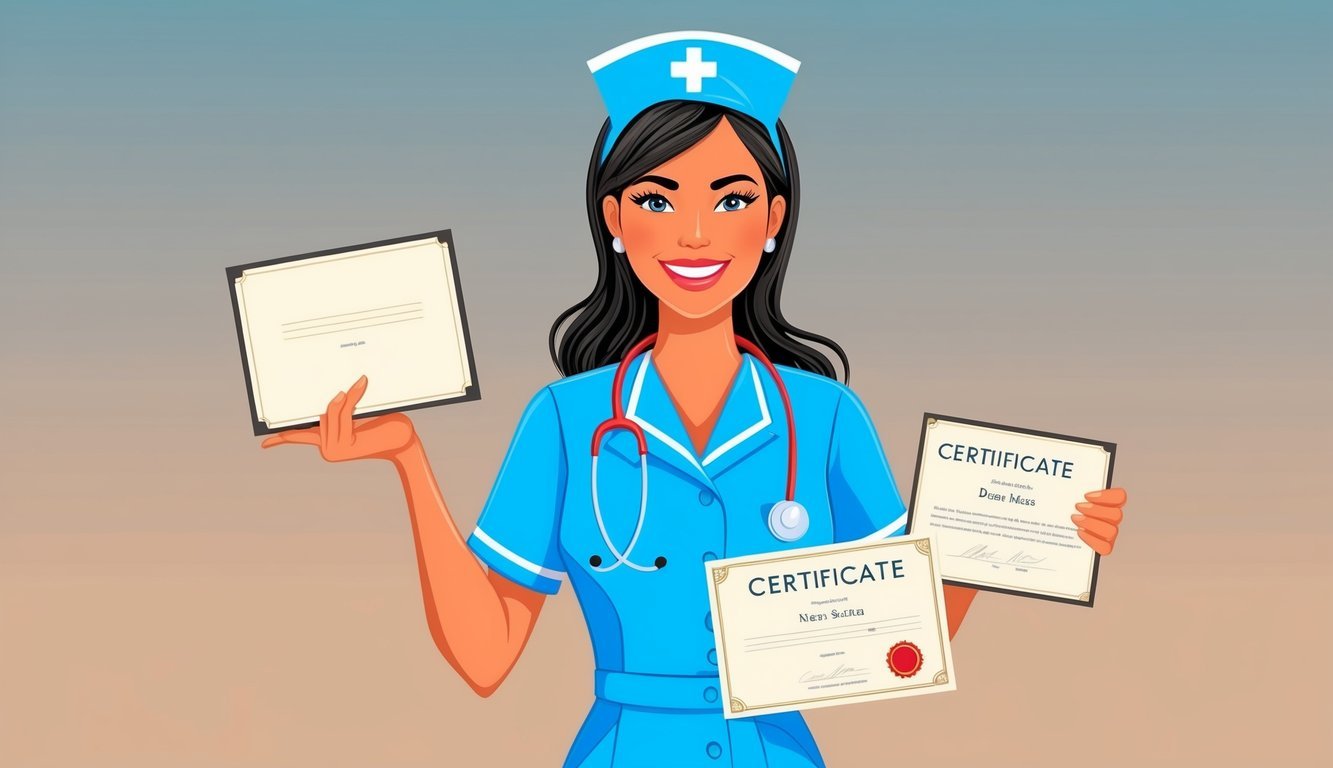As you consider a career in nursing, you must understand the differences in educational paths.
An RN diploma program is one of the traditional routes to becoming a registered nurse.
This program focuses on practical training in healthcare settings. It typically lasts around two years.
After completing the program, you will have the necessary skills to take the NCLEX-RN exam.
This allows you to enter the nursing workforce quickly.
While diploma programs may offer a more streamlined education, it’s essential to be aware of the evolving trends in nursing qualifications.
Many healthcare employers are increasingly favoring candidates with more advanced degrees, such as an Associate Degree in Nursing (ADN) or a Bachelor of Science in Nursing (BSN).
Nevertheless, a diploma remains a valid credential, providing you with the foundational skills needed for patient care and the opportunity to advance your career later on.
Understanding the structure and benefits of an RN diploma can help you make an informed decision about your nursing education.
If you want to learn more about the differences between various nursing degrees, explore this guide on nursing degrees.
With this knowledge, you’re better prepared to embark on your journey in nursing.
Overview of Nursing Education Pathways
Nursing education offers various pathways to meet the diverse needs of aspiring registered nurses.
Each pathway has specific requirements and culminates in the qualifications needed to sit for the NCLEX-RN examination.
Understanding these pathways is crucial for making informed decisions about your nursing career.
Understanding the RN Diploma
The RN Diploma program is one of the traditional routes to becoming a registered nurse.
This program typically occurs in hospital-based schools and lasts about 2-3 years.
Key highlights include:
- Focus on clinical skills and hands-on experience.
- Coursework emphasizes fundamental nursing principles and patient care.
- Graduates are eligible to take the NCLEX-RN for licensure.
While RN diplomas are less common today, they still serve as a valuable entry point for many nurses.
You can find more details on the benefits of this pathway here.
Associate Degree in Nursing (ADN)
The Associate Degree in Nursing (ADN) is another popular pathway.
Usually taking 2-3 years to complete at a community college, this program combines classroom instruction with hands-on clinical practice.
Key components include:
- General Education Requirements: Courses in sciences, humanities, and social sciences.
- Nursing Courses: Focused on clinical skills, critical thinking, and patient assessment.
- Preparation for NCLEX-RN: Ends with eligibility to sit for the licensure exam.
The ADN pathway is known for its accessibility and affordability.
In many areas, community colleges offer flexible schedules, making nursing education more attainable.
For more information on nursing pathways, visit this resource.
Bachelor of Science in Nursing (BSN)
The Bachelor of Science in Nursing (BSN) is a 4-year degree that provides a comprehensive foundation in nursing.
This program goes beyond clinical skills, incorporating leadership, research, and community health into the curriculum.
Important aspects include:
- In-depth Education: Nursing theory, biology, pharmacology, and psychology courses.
- Leadership Training: Preparation for roles in management and healthcare policy.
- Greater Job Opportunities: Many hospitals prefer or require a BSN for registered nurses.
The BSN degree is increasingly recognized as a standard for professional nursing practice.
You can learn more about its benefits here.
Advancing from RN to BSN
Many registered nurses pursue an RN-to-BSN program to further their education and career prospects.
These programs are designed for working nurses who wish to obtain a bachelor’s degree while continuing to work.
Key features include:
- Flexible Learning: Many programs offer online courses and part-time options.
- Accelerated Formats: Some institutions allow completion in as little as one year.
- Enhanced Skills: Focus on leadership, research, and advanced clinical practice.
Advancing to a BSN not only opens doors for career advancement but is often a prerequisite for pursuing graduate degrees.
Explore more about these programs here.
Options for Graduate Degrees in Nursing
For nurses looking to specialize further, graduate education is available through various advanced degree programs.
Common options include:
- Master of Science in Nursing (MSN): Focuses on specialized areas such as nurse practitioner or clinical nurse leader.
- Doctor of Nursing Practice (DNP): A terminal degree for advanced practice nursing and leadership roles.
Both degrees equip you with advanced knowledge and skills for high-level positions in healthcare.
Pursuing a graduate degree can significantly enhance your career trajectory and professional development.
For detailed options, check this link.
Licensing and Certification for Registered Nurses

Obtaining a nursing license and certification is essential for a registered nurse’s professional practice.
You must be informed about the examination process, state-specific requirements, and how to maintain your certification throughout your career.
The National Council Licensure Examination (NCLEX-RN)
To become a registered nurse, you must pass the National Council Licensure Examination for Registered Nurses (NCLEX-RN).
This standardized exam evaluates your knowledge and skills essential for safe and effective nursing practice.
The NCLEX-RN covers various topics, including:
- Safe and Effective Care Environment
- Health Promotion and Maintenance
- Psychosocial Integrity
- Physiological Integrity
You can check the exam format and study materials available on the NCSBN website.
Preparing effectively for this exam increases your chances of passing.
State License Requirements
Each state has specific licensing requirements that you must meet to practice as an RN.
Generally, you need to:
- Complete an accredited nursing program.
- Pass the NCLEX-RN.
- Submit your application for licensure to your state’s Board of Nursing.
Fees and processing times vary by state.
For example, some states may charge a fee of around $80-$100 with processing times ranging from a few weeks to several months.
For detailed state-by-state requirements, consult the Nurse.org guide.
Maintaining RN Certification
Once you are licensed, maintaining your certification is critical.
Many states require continuing education (CE) hours as part of the renewal process.
You may also need to renew your license every two years, often requiring proof of ongoing education or practice.
Check with your state’s Board of Nursing for specific CE requirements.
You can find resources for continuing education on websites like the American Nurses Association and other professional organizations.
Staying informed about your certification and licensing requirements is vital for your nursing career.
Career Opportunities and Specialties

The field of nursing offers diverse career paths and specialties that cater to various interests and skill sets.
You can find numerous entry-level positions and advanced roles that enhance your expertise and value in the healthcare landscape.
Entry-Level Nursing Job Prospects
As a recent RN diploma graduate, you can pursue several entry-level nursing job opportunities which include:
- Staff Nurse: Work in hospitals or clinics providing direct patient care.
- Clinical Nurse: Focus on specific departments such as surgery or pediatrics.
- Critical Care Nurse: Provide care for patients in critical condition, often in ICUs.
According to the Bureau of Labor Statistics, job growth for registered nurses is projected at 6% from 2023 to 2033.
This demand reflects the ongoing need for qualified RNs in various healthcare settings.
Entry-level positions often require strong communication skills and the ability to work in fast-paced environments, making your adaptability crucial.
For more information on career options, visit Nursing Careers & Specialties.
Specialization in Nursing
Once you gain experience, you may choose to specialize in areas that align with your interests.
Some popular nursing specialties include:
- Nurse Practitioner (NP): Provides primary and specialized care, often with greater autonomy.
- Pediatric Nurse: Focuses on the healthcare needs of infants, children, and adolescents.
- Geriatric Nurse: Specializes in caring for elderly patients.
Specializations often require additional training or certification.
Specializing can enhance your career prospects and salary potential, making it a valuable option to consider.
For a deeper exploration of nursing specializations, refer to 13 Nursing Specialties And Their Requirements.
Advanced Practice Roles
Advanced practice roles provide opportunities for RNs to take on greater responsibilities.
These roles often involve higher education and additional certifications.
Examples include:
- Clinical Nurse Specialist (CNS): Offers expert advice in specific clinical areas.
- Nurse Anesthetist: Provides anesthesia care and pain management in various settings.
These positions typically lead to higher salaries and more comprehensive care responsibilities.
Advanced practice roles are essential as they significantly impact patient outcomes and healthcare delivery.
For more on advanced nursing roles, consider the detailed resources available at 20 Types of Nurses.
The Importance of Clinical Experience
Clinical experience is a vital component of nursing education, directly impacting your readiness for professional practice.
It encompasses the hours you spend in hands-on situations, skill development, and transitioning into the workforce.
Each aspect plays a crucial role in shaping your nursing competencies.
Acquiring Clinical Hours During Education
During your education, accumulating clinical hours is essential.
This hands-on experience helps you apply theoretical knowledge to real-world situations.
You will work alongside experienced professionals in various healthcare settings, from hospitals to community clinics.
The specific requirements for clinical hours can vary by program.
Many nursing programs require a minimum number of hours, often around 400-600.
This time allows you to develop patient care skills while understanding diverse health conditions.
Key Benefits:
- Enhances patient assessment skills
- Develops your ability to work in a team
- Prepares you for complex clinical scenarios
You can find more information on clinical hour requirements in your targeted nursing program’s curriculum or visit resources like the American Association of Colleges of Nursing.
Transition to Professional Practice
The transition from student to practicing nurse is significantly influenced by your clinical experience.
Exposure to real patient care challenges builds confidence and competence, making you better prepared for your first job.
You’ll gain insights into the daily responsibilities of nursing, including teamwork and collaboration with other healthcare professionals.
This real-world experience can smooth the transition, allowing you to adapt quickly to the fast-paced environment of healthcare.
Considerations:
- Familiarity with healthcare technology
- Understanding of workplace protocols
- Development of a professional network
Engaging in clinical practice during your education sets a solid foundation for your career in nursing.
It equips you with practical skills and experience essential for success in the field.
Continuing Education and Advancement

In nursing, ongoing education is essential for staying current with best practices and advancing your career.
Pursuing further education unlocks new opportunities and helps you adapt to the evolving healthcare landscape.
Ongoing Education for RNs
As a registered nurse, you must complete continuing education units (CEUs) to maintain your license.
You can acquire these units through various formats, including online courses, workshops, and conferences.
You can also explore specialized certifications relevant to your practice area, such as those in nursing informatics or holistic nursing.
Engaging in lifelong learning enhances your skills and keeps you informed about the latest advancements in nursing research.
Many nursing organizations offer resources, including the American Nurses Association (ANA), which provides access to various educational materials and courses tailored specifically for nurses.
Career Advancement Through Further Education
Pursuing an RN-to-BSN program allows you to elevate your qualifications, making you more competitive in the job market.
Graduates often see a salary increase and improved job prospects in roles such as nurse manager or clinical specialist.
Advanced degrees, such as a Master’s in Nursing (MSN), open doors to positions like nurse educator or nurse practitioner.
These roles not only offer better compensation but also involve greater responsibilities, allowing you to influence patient care and nursing practices directly.
You will find that career advancement is often tied to educational achievements, providing you with greater autonomy and leadership opportunities in the nursing field.
Leadership and Education Roles
Furthering your education can lead to pivotal leadership roles within healthcare settings.
As a nurse educator, you can impact the next generation of nurses by sharing your expertise and experience.
Additionally, pursuing advanced education enables you to participate in nursing research.
This can help you contribute to evidence-based practices that shape the future of healthcare.
Occupying leadership positions often requires expertise in areas such as management, which can be developed through specialized programs.
This equips you with the necessary skills to lead teams and manage complex healthcare situations effectively.
By investing in your educational journey, you position yourself for success, both as a nurse and a leader in the healthcare community.

